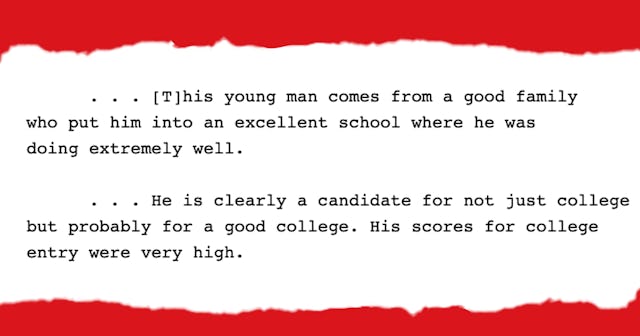Judge Wants Leniency For Teen Accused Of Rape Because He's From A 'Good Family'

The teen filmed the assault and shared the video among friends, along with the text message, “When your first time having sex is rape”
A 16-year-old girl who was so intoxicated she was “unable to walk without stumbling” and exhibited “visibly slurred speech” was lured into a closed off part of a basement during a party attended by 30 teenagers in 2017. The boy who led her there proceeded to bend her over, penetrate her from behind, and film it.
He later shared the video among friends, along with the text message, “When your first time having sex is rape.”
One of the friends who was forwarded the video said her head was repeatedly hitting a wall.
SUPERIOR COURT OF NEW JERSEY
After he was done, he left the room. Concerned for her well-being, some of his friends checked on her and immediately told the girl’s friends something was wrong. She was on the floor throwing up. She continued to be sick while being driven home by a friend’s mother. The next morning she told her mother she feared something sexual that she did not consent to had happened. She didn’t understand where the bruises on her body or her torn clothes came from.
But a few months later, after the victim and her family decided to pursue criminal charges, a family court judge would argue that the teen shouldn’t be charged as an adult for the admitted rape, in part because the defendant came from a good family. “[T]his young man comes from a good family who put him into an excellent school where he was doing extremely well,” Judge James Troiano said. “He is clearly a candidate for not just college, but probably for a good college. His scores for college entry were very high.”
He dismissed the boy’s text confession as “a 16-year-old kid saying stupid crap to his friends.”
At one point, the judge recalled a part of the text message testimony that said, “I fucked her, not raped her. Calm down. If you have the video, get rid of it.” He responded to that by saying, “[D]o I believe that it shows in any way a calculation or cruelty on his part or sophistication or a predatory nature? No, I do not.” He denied the waiver to try the teenager as an adult.
Unfortunately, the physical evidence of the video no longer exists because after the victim’s family went to the police with an initial goal of getting the video destroyed, a responding officer, with clearance from his sergeant, advised all the boys to delete the video. The victim and her family decided to pursue criminal charges, but now without the physical evidence that once existed, and at the mercy of yet another judge who values a predator’s “future” more than a victim’s justice.
So this fine, upstanding young man led a visibly intoxicated girl into a darkened area of a basement, secured the door closed with a foosball table, bent her over and penetrated her — which by one account allegedly caused her head to bang repeatedly against a wall — filmed the entire thing, and sent that video to seven of his friends with the message “When your first time having sex is rape,” but this judge saw nothing “predatory or cruel” enough for the perpetrator to be charged. Not only that, he scolded the prosecution for not explaining to the girl and her family that pressing charges would have a “devastating effect” on the boy’s life.
SUPERIOR COURT OF NEW JERSEY
Thankfully, the judge has been harshly called out by an appeals court in a 14-page ruling. The result is that the case may now move from a family court to a grand jury, where the teenager will be tried as an adult. But how many other of these types of rulings are flying under the radar? It’s far from the first time we’ve seen judges more concerned for a rapist’s reputation than a victim’s justice. Who can forget Judge Aaron Persky responding to the brutal rape of a Stanford student by Brock Turner with a six-month sentence? “A prison sentence would have a severe impact on him,” Perksy said. “I think he will not be a danger to others.”
Then there was the judge who called the sexual assault of a 12-year-old girl “not especially heinous or cruel.”
And the judge who asked a rape victim during trial if she’d tried “closing her legs” to prevent her assault.
And the judge who gave a school bus driver found guilty of raping a 14-year-old no jail time because he only raped one girl.
And it’s not the first time Judge Troiano exhibited biased behavior in a rape trial. The New York Times reports that in 2004, he “imposed a gag order to prohibit people in a courtroom from discussing the high-profile case of two Montclair High School football players accused of sexually assaulting a schoolmate. The charges were eventually dropped.”
This is rape culture. Time and time again these rulings tell women and girls they don’t matter — their bodies are not their own. Time and time again we rely on men who themselves don’t seem to understand the definition of rape to make a ruling. When Judge Troiano denied the waiver to try the teen as an adult he argued that there was a distinction between sexual assault and rape — and that a “traditional case of rape” only occurs when two or more men drag a woman at gunpoint into an abandoned shed, shack, or house.
If you wonder why women are angry — this is why.
THIS. IS. WHY.